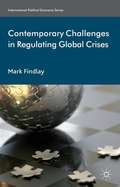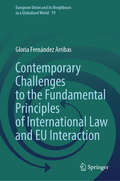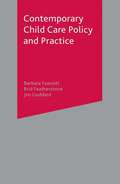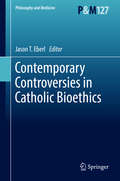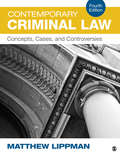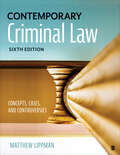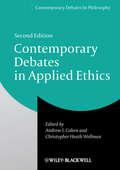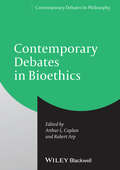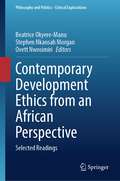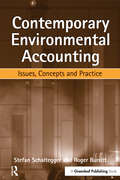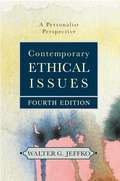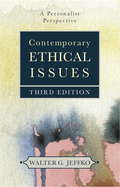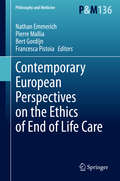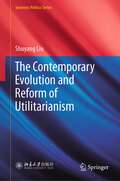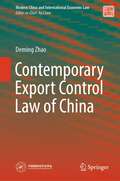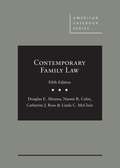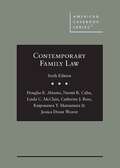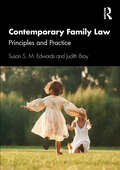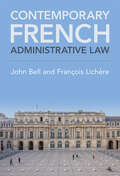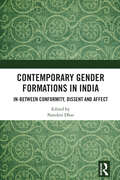- Table View
- List View
Contemporary Challenges in Regulating Global Crises
by Mark FindlayMark Findlay's treatment of regulatory sociability charts the anticipated and even inevitable transition to mutual interest which is the essence of taking communities from shared risk to shared fate. In the context of today's global crises, he explains that for the sake of sustainability, human diversity can bond in different ways to achieve fate.
Contemporary Challenges in the Jury System: A Comparative Perspective (Routledge Contemporary Issues in Criminal Justice and Procedure)
by Nicola MonaghanThis collection explores a variety of issues facing contemporary juries, bringing together innovative research from different disciplines and jurisdictions. The debate stems from a real concern that criticism of the jury may lead to a loss of public confidence in the institution and that this may renew government efforts to further restrict the role of the jury in criminal proceedings in England and Wales. This work offers an interdisciplinary approach presenting insights from legal, psychological and criminological perspectives, thus bypassing traditional borders and presenting a cohesive view. Issues discussed reflect the rapid advances in technology, changing dynamics and behaviours in society, and challenges that have been aggravated by the Covid-19 pandemic. Whilst the focus is primarily on juries in England, Wales, Scotland and across Ireland in terms of challenges and opportunities, the collection also invites a comparative perspective, drawing on experiences and related research in other jurisdictions. The book will be of interest to academics, researchers and policy-makers working in the areas of criminal law and procedure, criminal justice, criminology and psychology.
Contemporary Challenges to the Fundamental Principles of International Law and EU Interaction (European Union and its Neighbours in a Globalized World #19)
by Gloria Fernández ArribasThis book, finished in September 2023, addresses the fundamental principles enshrined in Resolution 2625 (XXV): sovereignty, the principle of non-intervention, the prohibition of the use of force, and self-determination. Studying these principles can help us understand some of the main features of international law and the international community in the 21st century: the role of traditional and new subjects alike; the sources of international law; issues of international responsibility; and new international challenges. For this purpose, the book analyses in each chapter the main controversial practices regarding principles. In addition, a section is devoted to an analysis of the particular relationship between the European Union and these principles, given the EU's unique role as an important evolution in international law as both a subject and treaty maker. Further, the EU provides an example of the institutionalisation of the international community and helps to solidify the concept. The book is chiefly intended for experts on International Law. Its purpose is to offer an updated vision of the international community through analysis of the core principles of international law, highlighting contradictions and problems regarding its application and interpretation. The book should also be of great interest and value to those starting careers in international law, offering them key insights into the international community and the roots of the international system.
Contemporary Challenges to the Laws of War
by Caroline Harvey James Summers Nigel D. White Caroline Harvey James SummersThe laws of war are facing new challenges from emerging technologies and changing methods of warfare, as well as the growth of human rights and international criminal law. International mechanisms of accountability have increased and international criminal law has greater relevance in the calculations of political and military leaders, yet perpetrators often remain at large and the laws of war raise numerous normative, structural and systemic issues and problems. This edited collection brings together leading academic, military and professional experts to examine the key issues for the continuing role and relevance of the laws of war in the twenty-first century. Marking Professor Peter Rowe's contribution to the subject, this book re-examines the purposes of the laws of war and asks whether existing laws found in treaties and customs work to achieve these purposes and, if not, whether they can be fixed by specific reforms or wholesale revision.
Contemporary Child Care Policy and Practice
by Barbara Fawcett Brid Featherstone Jim GoddardThis important text will provide a critical analysis of contemporary developments in child care policy under New Labour and the resulting policy and practice implications. The authors will draw on sociological debates, the growing children's rights literature and wider developments within social policy in order to provide a thorough and balanced guide to contemporary developments in this rapidly changing field. Ideologies behind recent initiatives in a wide range of practice areas are explored, and the implementation of key developments are appraised. This will be primary reading for all students specializing in work with children and their families.
Contemporary Christian Morality: Real Questions, Candid Responses
by Richard C. SparksIn a question-and-answer format, this book presents answers to 100 of the most pressing questions in Christian (Catholic, Protestant, and Anglican) ethics. A reliable introduction that takes on hot-button issues, including sexuality and politics, in a thoughtful and clear way.
Contemporary Controversies in Catholic Bioethics (Philosophy and Medicine #127)
by Jason T. EberlThis volume comprises various viewpoints representing a Catholic perspective on contemporary practices in medicine and biomedical research. The Roman Catholic Church has had a significant impact upon the formulation and application of moral values and principles to a wide range of controversial issues in bioethics. Catholic leaders, theologians, and bioethicists have elucidated and marshaled arguments to support the Church's definitive positions on several bioethical issues, such as abortion, euthanasia, and reproductive cloning. Not all bioethical issues, however, have been definitively addressed by Catholic authorities, and some Church teachings allow for differing applications in diverse circumstances. Moreover, as new biomedical technologies emerge, Church authorities rely on experts in science, medicine, philosophy, theology, law, and other disciplines to advise them. Such experts continue to debate issues related to reproduction, genetics, end-of-life care, and health care policy. This volume will be a valuable resource for scholars in bioethics or Catholic studies, who will benefit from the nuanced arguments offered based on the latest research. This volume is also instructive for students entering the field to become aware of the founding philosophical and theological principles informing the Catholic bioethical worldview.
Contemporary Criminal Law: Concepts, Cases, and Controversies
by Matthew LippmanContemporary Criminal Law: Concepts, Cases, and Controversies, Fourth Edition, combines the traditional concepts taught in undergraduate criminal law courses with thought-provoking cases and engaging learning tools. This bestselling text covers both foundational and emerging legal topics, such as terrorism, gangs, cybercrime, and hate crimes, in a student-friendly and approachable manner. Clear explanations of criminal law and defenses are complemented by provocative, well-edited cases and discussion questions that stimulate critical thinking and in-class discussion.
Contemporary Criminal Law: Concepts, Cases, and Controversies
by Matthew LippmanContemporary Criminal Law: Concepts, Cases, and Controversies, Fourth Edition, combines the traditional concepts taught in undergraduate criminal law courses with thought-provoking cases and engaging learning tools. This bestselling text covers both foundational and emerging legal topics, such as terrorism, gangs, cybercrime, and hate crimes, in a student-friendly and approachable manner. Clear explanations of criminal law and defenses are complemented by provocative, well-edited cases and discussion questions that stimulate critical thinking and in-class discussion.
Contemporary Criminal Law: Concepts, Cases, and Controversies
by Matthew LippmanProviding a current view that prompts students to read and analyze, Contemporary Criminal Law: Concepts, Cases, and Controversies, Sixth Edition, by Matthew Lippman, combines the concepts taught in undergraduate criminal law courses with thought-provoking cases and engaging learning tools. The text uses real-life examples that students connect to and recognize to cover emerging legal topics including constitutional rights, consent, arson, identity theft, and hate crimes. Lippman clearly defines and explains criminal law and defenses and provides cases and discussion questions to stimulate critical thinking and in-class discussion. Every chapter includes cases, case notes, model penal code and discussion boxes, and learning tools. This title is accompanied by a complete teaching and learning package.
Contemporary Criminal Law: Concepts, Cases, and Controversies
by Matthew LippmanProviding a current view that prompts students to read and analyze, Contemporary Criminal Law: Concepts, Cases, and Controversies, Sixth Edition, by Matthew Lippman, combines the concepts taught in undergraduate criminal law courses with thought-provoking cases and engaging learning tools. The text uses real-life examples that students connect to and recognize to cover emerging legal topics including constitutional rights, consent, arson, identity theft, and hate crimes. Lippman clearly defines and explains criminal law and defenses and provides cases and discussion questions to stimulate critical thinking and in-class discussion. Every chapter includes cases, case notes, model penal code and discussion boxes, and learning tools. This title is accompanied by a complete teaching and learning package.
Contemporary Debates in Applied Ethics (Contemporary Debates in Philosophy #7)
by Andrew I. Cohen Christopher Heath WellmanNow in an updated edition with fresh perspectives on high-profile ethical issues such as torture and same-sex marriage, this collection pairs cogently argued essays by leading philosophers with opposing views on fault-line public concerns. Revised and updated new edition with six new pairs of essays on prominent contemporary issues including torture and same-sex marriage, and a survey of theories of ethics by Stephen Darwall Leading philosophers tackle colleagues with opposing views in contrasting essays on core issues in applied ethics An ideal semester-length course text certain to generate vigorous discussion
Contemporary Debates in Bioethics (Contemporary Debates in Philosophy #27)
by Arthur L. Caplan Robert ArpContemporary Debates in Bioethics features a timely collection of highly readable, debate-style arguments contributed by many of today’s top bioethics scholars, focusing on core bioethical concerns of the twenty-first century. Written in an engaging, debate-style format for accessibility to non-specialists Features general introductions to each topic that precede scholarly debates Presents the latest, cutting-edge thoughts on relevant bioethics ideas, arguments, and debates
Contemporary Development Ethics from an African Perspective: Selected Readings (Philosophy and Politics - Critical Explorations #27)
by Beatrice Okyere-Manu Stephen Nkansah Morgan Ovett NwosimiriThis book offers fresh academic insights, reflections, questions, issues, and approaches to development ethics, taking into account, African values and ethics. Development ethics is an area of applied ethics that examines the moral issues involved in global, social, and economic transformation. While it is a relatively new discipline, there have been numerous scholarly publications on it from Western perspectives. However, only a few studies that focused on development ethics from the African perspective. To address this gap, the book seeks to answer critical questions such as "What does development mean to Africans?", "How can we measure development?", "Who gets to decide?", and "What constitutes just development in Africa?" With contributions from African scholars from diverse backgrounds, the book covers various development themes such as Theories and approaches to development ethics in Africa, Environmental Ethics and African Development, Ethics, Politics and African Development, Migration and African development, Gender, Ethics and Socio-economic Development in Africa, Education, Ethics and African development. It is an essential resource for researchers, lecturers, and students interested in political philosophy and African culture studies.
Contemporary Environmental Accounting: Issues, Concepts and Practice
by Stefan Schaltegger Roger BurrittContemporary Environmental Accounting: Issues, Concepts and Practice has been written by two of the world's leading experts in the field in order to provide the most comprehensive and state-of-the-art textbook on environmental accounting yet attempted. The book is suitable for both undergraduate and graduate students and their teachers, professional accountants, and corporate and organisational managers. Although no prior knowledge of environmental accounting is necessary to understand the critical issues at stake, academic accountants will also find that the book provides a useful introduction to the topic. The goals of the book are to discuss and illustrate contemporary conceptual approaches to environmental accounting; to make readers aware of crucial controversial topics; and to offer practical examples of how the concepts have been applied throughout Europe, North America and Australia. In order to increase the usefulness of the book for relevant courses, each chapter concludes with a set of questions for review. This book is essential reading for all those who are interested in how environmental issues influence accounting.A solutions manual is available on request with the purchase of this book.
Contemporary Ethical Issues: A Personalist Perspective (Fourth Edition)
by Walter G. JeffkoPhilosophy professor Walter G Jeffko explores a series of contemporary ethical problems from a personalistic perspective influenced by the Scottish philosopher John Macmurray (1891-1976). Professor Jeffko utilizes key elements of Macmurray's thought in developing his own viewpoint; and he relates Macmurray's ideas to those of a wide variety of important philosophers, ethicists, and behavioral scientists. In the opening chapter Jeffko develops a personalistic anthropological and ethical theory within a framework that views the person a relational and rational agent, reason as the standard of value, and the principle of community as the supreme ethical standard.In successive chapters, this theory is applied to the issues of suicide, abortion, euthanasia (including assisted suicide), the death penalty, privacy (including private property and capitalism), the moral treatment of animals, and affirmative action. Jeffko connects ethics with logic in a lucid style that blends scholarship with readability. This is a fresh and absorbing examination of the key ethical dilemmas of our time.
Contemporary Ethical Issues: A Personalist Perspective (3rd Edition)
by Walter G. JeffkoNow in a newly revised third edition, this explores a series of compelling moral problems from a personalist perspective influenced by the Scottish philosopher John Macmurray (1891-1976). In many publications spanning fifty years, most notably his Gifford Lectures titled "The Form of the Personal," Macmurray developed a robust personalism that emphasizes the primacy of persons as rational agents. In hisview, self-realization is achieved in community where justice and individual rights are respected. From the background of a liberal Roman Catholic, Walter G. Jeffko utilizes key elements of Macmurray's thought in developing his own philosophical viewpoint, and he relates Macmurray's ideas to those of a wide variety of important philosophers, ethicists, and other notable thinkers, including ecologists and war theorists. New to this third edition is an essay on the moral treatment of civilians in war, including a rigorous critique of Michael Walzer's "supreme emergency" and the communitarianism that grounds it. Many recent Supreme Court decisions are evaluated, as is the threat to our democracy posed by unlimited sums of money in politics, the growing inequality of wealth and income, and the rise of political extremism on the right and its threat to women's rights. Jeffko brings logical precision and a lucid style to the study of ethics, blending powerful scholarship with readability.
Contemporary European Perspectives on the Ethics of End of Life Care (Philosophy and Medicine #136)
by Bert Gordijn Nathan Emmerich Pierre Mallia Francesca PistoiaThis book examines the ethics of end of life care, focusing on the kinds of decisions that are commonly made in clinical practice. Specific attention is paid to the intensification of treatment for terminal symptoms, particularly pain relief, and the withdrawal and withholding of care, particularly life-saving or life-prolonging medical care. The book is structured into three sections. The first section contains essays examining end of life care from the perspective of moral theory and theology. The second sets out various conceptual terms and distinctions relevant to decision-making at the end of life. The third section contains chapters that focus on substantive ethical issues. This format not only provides for a comprehensive analysis of the ethical issues that arise in the context of end of life care but allows readers to effectively trace the philosophical, theological and conceptual underpinnings that inform their specific interests. This work will be of interest to scholars working in the area as well as clinicians, specialists and healthcare professionals who encounter these issues in the course of their practice.
The Contemporary Evolution and Reform of Utilitarianism (Interests Politics Series)
by Shuyang LiuThis book is a monograph on contemporary utilitarianism, focusing on its evolving path and logic. It describes the evolution of utilitarianism from the classical model to the contemporary model and then summarizes the characteristics of contemporary utilitarianism, revealing its advantages and disadvantages. This book points out that the best characteristic of contemporary utilitarianism is to give up traditional view of individualism and take balanced attitude to the relationship between individual and community. The change makes the goal of contemporary utilitarianism from the pursuit of maximizing the sum of individual utilities to optimal social utility. Therefore, the contemporary utilitarianism gradually evolves a public philosophy with multiple interests structure, which provides a new way to solve the contradiction between personal interest and public interest.Utilitarianism is still an important political philosophy in western society, but its existing defects actually make it difficult to have a transformative impact on western institutional structure and system. The target audience of this book are students and researchers majoring in politics and ethics.
Contemporary Export Control Law of China (Modern China and International Economic Law)
by Deming ZhaoThis book gives practical and in-depth presentation and analysis of the issues under China export control law and economic sanctions regime. This book not only addresses issues faced by the legal entities in China, but also attends to the concerns about Chinese extra-territorial jurisdiction of China export control law and sanctions legislations, on the part of foreign companies. Finally, the author shares his experiences on how to structure export control and sanctions compliance under Chinese law on the part of both Chinese and foreign companies.
Contemporary Family Law (American Casebook)
by Douglas E. Abrams Naomi R. Cahn Catherine J. Ross Linda C. McClainThe book emphasizes that contemporary families take a variety of forms, including marital and nonmarital adult relationships, and that constitutional considerations play an increasingly important role in family law. The fifth edition preserves and builds on the approach of the earlier editions: presenting core substantive family law doctrine while also exploring ongoing and emerging policy debates and discussing the importance of cross-disciplinary collaborations with experts in fields such as psychology and accounting. <p><p> A limited number of new cases replace older ones in most chapters, and the introductions to and notes and questions following each lead case, statute, or article have been thoroughly updated. In addition, problems for discussion in each chapter―including new and updated problems for this edition―enable students to apply doctrine in real-life settings that lawyers face. The book also introduces the myriad issues central to family law practice and to a lawyer's ethical and professional responsibilities. <p><p> The book includes material on shifting paradigms in family law practice and the roles of family lawyers, and devotes separate chapters to professional ethics, alternative dispute resolution, and private ordering. The book addresses jurisdictional issues in one integrated chapter. In addition to providing a grounding in the historical and contemporary regulation of marriage, the book includes material throughout on the legal treatment of nonmarital couples and their children. The book also explores the diverse pathways to legal parentage and their impact on parent-child and co-parent relationships. Moreover, because child custody arrangements lead to some of the most acrimonious family disputes, this casebook devotes two chapters to custody: the first treats the initial custody decision, and the second explores continuing litigation concerning visitation, custody, and key childrearing decisions after the initial disposition, including disputes involving third parties such as cohabitants and grandparents. Both custody chapters include disputes involving nonmarital children. The fifth edition includes new and expanded material throughout.
Contemporary Family Law (American Casebook Series)
by Douglas Abrams Catherine Ross Naomi Cahn Linda McClain Kaiponanea Matsumura Jessica WeaverThis popular family law casebook engages students by presenting core family law doctrine while exploring significant transformations in American families and cutting-edge policy debates. It highlights the important role of constitutional law―and other areas of state and federal law―in shaping family law. The book invites students to consider questions of family definition and governmental regulation of families in light of family law’s purposes. It charts family law’s evolving approach to adult-adult and parent-child (and other caretaker-dependent) relationships, emphasizing that contemporary families take a variety of forms. The Sixth Edition updates all chapters to reflect the latest family law developments, such as the legal treatment of nonmarital families (including plural relationships) and nonbiological parenting as well as recent Supreme Court decisions. It integrates material previously covered in separate chapters on ethical issues in family law practice and jurisdiction into the contexts in which they arise, such as divorce, child custody, and division of marital property. The Sixth Edition has new material highlighting the intersection of family law with race, gender, class, immigration, sexual orientation, and gender identity.
Contemporary Family Law: Principles and Practice
by Susan S. Edwards Judith BrayTaking a fresh and modern approach, Contemporary Family Law: Principles and Practice gives students all the information they need to develop a clear understanding of this fascinating area of the law. Covering the very latest developments in family law, each chapter uses contemporary cases as a window to introducing core legal concepts, principles and developments, emphasising the dynamism and evolving nature of family law, in which practitioners, campaigners, law reformers and students all play their part.Key features include: Developments in family law are considered not only from a vantage point of judicial decision making but also from the perspective of the contribution made by solicitors, barristers and experts. This encourages students to develop a sense of their own potential agency when as future practitioners they represent their clients and engage in law reform In considering legal argument and case determination, the book places equality front and centre, including access to justice Each chapter provides further reading with online links and URLs and a set of self-test questions, including problem scenarios and discursive essay questions. Each form of assessment ref lects the levels of educational attainment and mirrors testing techniques relevant to academic examination and legal professional and vocational practice courses This uniquely contemporary textbook will be essential reading for all students of family law.
Contemporary French Administrative Law
by John Bell François LichèreDespite the growing scholarly interest in comparative public law, there remain relatively few works on the subject. Contemporary French Administrative Law aims to redress that imbalance, offering English-language readers an authoritative introduction to the key features of French administrative law and its institutions. The French legal system is among the most well-developed and influential in the world, and, as procedures continually adapt to European and international influences, it has never been more worthy of research, study and interrogation. This book employs a wide range of recent, illustrative cases to demonstrate how French administrative law works both in theory and in practice. Using a systematic approach and covering everything from judicial review to public contracts, this is a highly valuable text for any student or researcher with an interest in French law. The book is also available as Open Access.
Contemporary Gender Formations in India: In-between Conformity, Dissent and Affect
by Nandini DharThe volume discusses critical issues surrounding the developments in gender movements in the last two decades in India following the Delhi rape case and the ensuing massive protests in December 2012. A critical documentation of some of the key moments surrounding the contemporary gendered formations and radicalisms in South Asia, the chapters span questions of class, caste, sexuality, digital feminisms, and conflict zones. The book looks at anger, protest, and imaginations of resistance. It showcases the ‘new’ visibility that digital spaces have opened up to lend voice to survivors who are let down by traditional justice mechanisms and raises questions regarding ‘individualized’ modes of seeking justice as against traditional ‘collective’ voices that have always been a hallmark of movements. The volume analyses and criticizes the complicity of the state and the court as agents of reinforcing gender violence – an issue that has not been theorized enough by activists and scholars of violence. Further, it also delves into the #MeToo movement and the LoSHA, as both have raised contentious, controversial, and often conflicting debates on the nature of addressing sexual harassment, particularly at the workplace. Calling for further debate and discussions of cyberspace, gender justice, sexual violence, male entitlement, and forms of neoliberal feminism, this volume will be of immense interest to scholars and researchers in the areas of women and gender studies, sociology and social theory, gender politics, political theory, democracy, protest movements, politics, media and the internet, political advocacy, and law and legal theory. It will also be a compelling read for anyone interested in gender justice and equal rights.
